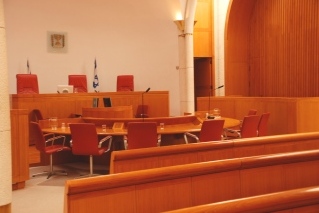 Photo by Melanie Takefman
Photo by Melanie TakefmanThe court announced its decision thirteen years after the petition was filed.
Today (8 May 2012), the Supreme Court announced its decision to reject a petition submitted by the Association for Civil Rights in Israel (ACRI) in 1999 to cancel the official state of emergency that has been in place since Israel’s declaration of independence in 1948.
The official state of emergency allows the State to impose otherwise unconstitutional restrictions on a wide array of individual and collective rights and freedoms in Israel, including labor rights, property rights, and freedom of expression.
A panel of justices, including former Supreme Court President Dorit Beinisch, ruled that “the appeal has exhausted itself, although the work has not been finished.”
From the decision (para 18):
“Israel is a normal country that isn’t normal; it is normal in that it is an active democracy in which fundamental rights including free elections, freedom of expression, and independence of courts and legal advisers, are safeguarded. It essentially fulfills its mandate as a Jewish and democratic state. [Israel] is not normal in that its existential threats have yet to be quelled, the only democratic country in that position today; and has not properly settled its relations with its neighboring states, aside from peace accords with Egypt and Jordan and certain agreements with the Palestinians; and the battle against terror continues, and apparently will continue for the foreseeable future. . . The ‘mass of normality’ is sufficient to request that emergency legislation will be suited to the normal face and not normal face as one. This is an attainable goal; not in the clouds.”
Israel has been in official state of emergency continuously since the establishment of the State in 1948. In 1992, the Knesset passed Basic Law: The Government which created an outer limited to the state of emergency of one year, but allows for unlimited renewals. Since the law went into effect, every government has renewed the state of emergency every year without fail.
In 1999, ACRI submitted a petition to the Supreme Court against the Knesset and the government seeking the annulment of the state of emergency. ACRI argued that the state of emergency permitted the enactment of secondary laws and regulations that place severe restrictions on freedoms of expression and of assembly; violate individual property rights; and are in contravention of Basic Law: Human Liberty and Dignity. Although the Justice Ministry has, in accordance with the Court’s prior directives, slowly begun to replace some of the emergency laws and ordinances with modern legislation, the process is far from complete, and some of the most contentious laws remain in force.
Attorney Dan Yakir, ACRI’s Chief Legal Counsel: “In the thirteen years the petition was pending, the government could have completed the required legislative corrections. The declaration of a state of emergency and the legislation validated thereunder grant draconian and far-reaching powers to the government. The fear that these powers will be misused and result in a violation of basic human rights is especially salient on the eve of the establishment of the widest coalition in the history of the state. Rather than setting a barrier against the use of the far reaching powers granted by the declaration, the Justices settled for a recommendation to the government to complete what has not been completed in thirteen years. The past weeks have shown – and not for the first time – that the government is in no hurry to implement the Supreme Court’s judgments, leaving doubt as to how and whether the Supreme Court Justices’ recommendations will be addressed.”







